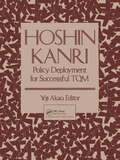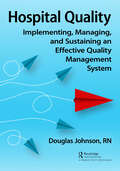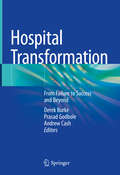- Table View
- List View
Hoshin Kanri: Policy Deployment for Successful TQM
by Yoji AkaoFor Florida Power and Light, Hewlett-Packard, and Texas Instruments, policy deployment has created a critical bridge between corporate goals and their company-wide deployment. Hoshin Kanri offers top and middle managers a guide to customizing a policy deployment program especially suited to their company.This book is a compilation of examples of policy deployment and demonstrates how company vision is converted into individual responsibility. It contains practical guidelines, 150 charts and diagrams, and five case studies that illustrate the procedures of Hoshin Kanri. The six steps to advanced process planning are reviewed and include: a five-year vision; one-year plan; deployment to departments; execution; monthly audit; and annual audit. The practice of Hoshin Kanri will enable you to: Align all departmental and individual project goals to corporate goals and eliminate duplication of effort.Communicate to every employee his or her role in achieving the company vision.Closely monitor performance using carefully devised measures of progress.Learn how Hoshin Kanri can increase your company's responsiveness to social, economic, and technical changes through flexible strategic management. (Originally published by the Japanese Standards Association)
Hoshin Kanri: Policy Deployment for Successful TQM
by Yoji AkaoFor Florida Power and Light, Hewlett-Packard, and Texas Instruments, policy deployment has created a critical bridge between corporate goals and their company-wide deployment. Hoshin Kanri offers top and middle managers a guide to customizing a policy deployment program especially suited to their company. This book is a compilation of examples of policy deployment and demonstrates how company vision is converted into individual responsibility. It contains practical guidelines, 150 charts and diagrams, and five case studies that illustrate the procedures of Hoshin Kanri. The six steps to advanced process planning are reviewed and include: a five-year vision; one-year plan; deployment to departments; execution; monthly audit; and annual audit. The practice of Hoshin Kanri will enable you to: Align all departmental and individual project goals to corporate goals and eliminate duplication of effort. Communicate to every employee his or her role in achieving the company vision. Closely monitor performance using carefully devised measures of progress. Learn how Hoshin Kanri can increase your company's responsiveness to social, economic, and technical changes through flexible strategic management.(Originally published by the Japanese Standards Association)
Hoshin Kanri: The Strategic Approach to Continuous Improvement
by David HutchinsThe results of the quality revolution have been mixed. Global competition has elevated the most successful companies, in terms of providing goods and services, but even then initiatives such as total quality, business process re-engineering and Six Sigma have been heralded as the solution, only to have been replaced with the next 'big thing' when it came along. Hoshin Kanri is not the next big thing in quality, it is a strategic approach to continuous improvement that provides a context for all of the individual elements such as Six Sigma or Lean Manufacturing. David Hutchins' Hoshin Kanri shows you how to develop a dynamic vision for continuous improvement; to implement effective policies to support it; to link key performance indicators to Six Sigma, Lean Manufacturing and Kaizen and to sustain a strategy-led programme for improving business performance.
Hospice Palliative Home Care and Bereavement Support: Nursing Interventions and Supportive Care
by Lorraine Holtslander Shelley Peacock Jill BallyThis book provides an unique resource for registered nurses working in hospice palliative care at home and for the community, outside of acute care settings and also incorporates literature related to palliative care in acute health care settings, as part of the overall services and supports required. Very few resources exist which specifically address hospice palliative care in the home setting, despite the fact that most palliative care occurs outside acute care settings and is primarily supported by unpaid family caregivers. An overview of the concerns for individuals and families, as well as specific nursing interventions, from all ages would be an excellent support for nursing students and practicing registered nurses alike.The book structure begins with a description of the goals and objectives of hospice palliative care and the nursing role in providing excellent supportive care. Chapters include research findings and specifically research completed by the authors in the areas of pediatric palliative care, palliative care for those with dementia, and the needs of family caregivers in bereavement. Interventions developed by the editors are provided in this book, such as the “Finding Balance Intervention” for bereaved caregivers; the “Reclaiming Yourself” tool for bereaved spouses of partners with dementia; and The Keeping Hope Possible Toolkit for families of children with life threatening and life limiting illnesses. The development and application of these theory-based interventions are also highlighted. Videos and vignettes written by family caregivers about what was helpful for them, provide a patient-and family-centered approach.The book will benefit nursing students, educators and practicing registered nurses by providing information, theory, and evidence from research.
Hospitable Healthcare: Just What the Patient Ordered!
by Stowe Shoemaker Peter Yesawich&“We thought we knew what patients needed..."– Dr. James Merlino, Cleveland ClinicMost consumers agree their service experiences with hospitals, clinics, and physicians fall well short of their service experiences with hotels, resorts, and restaurants. So, what would their experiences be like if healthcare providers served them the same way hospitality providers do? Given that both industries share many common service touchpoints, one wonders whether healthcare service providers could adopt principles of hospitality to enhance the patient experience. The insights shared in this book reveal the answer: yes! Rich with original survey data, examples, and interviews with widely admired hospitality and healthcare service practitioners, Hospitable Healthcare is a valuable resource guaranteed to enhance the patient experience. The first of its kind, Hospitable Healthcare introduces healthcare providers to an original service model based on principles the hospitality industry has used to create great guest experiences: PAEER (for Prepare, Anticipate, Engage, Evaluate, Reward). The model addresses four trends impacting healthcare: more patient-directed selection of healthcare service providers; greater transparency in the pricing of healthcare services to promote competition; more direct-to-consumer marketing to attract new patients; and the growing importance of patient satisfaction when payors determine reimbursement. As Shoemaker&’s and Yesawich&’s work reveals, Hospitable Healthcare is indeed just what the patient ordered!
Hospital 4.0: Schlanke, digital-unterstützte Logistikprozesse in Krankenhäusern
by Jürgen Schröder Henner GimpelDie medizinischen und pflegerischen Kernprozesse eines Krankenhauses werden durch zahlreiche Logistikprozesse unterstützt, die hohe Anforderungen an Qualität, Individualisierung, Echtzeitreaktionsfähigkeit und Kosteneffizienz stellen. Dennoch trifft man häufig auf Verschwendungen von wichtigen Ressourcen, wie Material, Fläche oder Arbeit. Schlanke Logistikprozesse sind leider eher selten. Um Logistikprozesse auf die Kernprozesse auszurichten, fokussiert sich dieses Buch auf die Weiterentwicklung von innovativen Logistiksystemen in Krankenhäusern. Hier liegt Potenzial, das durch die Digitalisierung der Logistikprozesse gehoben werden kann.Im Detail werden zwei Referenzmodelle zur „Materiallogistik“ und der „Bettenlogistik“, vorgestellt, die ein Konzept für digital-unterstützte, verschwendungsarme Logistikprozesse in Kliniken aufzeigen. Darüber hinaus werden Methoden zur Anwendung der Referenzmodelle erläutert. Diese Erkenntnisse stammen aus einem angewandten Forschungsprojekt mit zwei Krankenhäusern der maximalen Versorgungsstufe in Süddeutschland.
Hospital 57357: Aligning Performance Towards a Vision of a Cancer-Free Childhood
by Susanna Gallani Youssef Abdel AalThe case follows the Children Cancer Hospital in Egypt, also known as Hospital 57357, as it goes through the roll-out of a new performance management system, which Dr. Sherif Abouel Naga, founder and CEO of the hospital, had championed. This was a critical juncture as the largest pediatric cancer hospital in the world was transitioning from a traditional, relatively informal operating style to a performance management system that was tightly structured and data driven. Dr. Abouel Naga had tasked a newly assembled management team with defining a strategy to ensure that 57357 remained a world leader in quality healthcare for children with cancer in an evolving and uncertain market landscape. While Dr. Abouel Naga was confident that a system that measured each individual's contribution to the strategy would make a difference in the overall performance of the organization, critics worried about how employees might respond to the tight structure that came with this system. How could they ensure there would still be plenty of room for creativity and innovation, which were so important in the delivery of care? Would the new system allow to adapt quickly to evolving market conditions without generating confusion among the staff?
Hospital Capacity Management: Insights and Strategies
by Robbin Dick Robert AgnessHospital Capacity Management: Insights and Strategies details many of the key processes, procedures, and administrative realities that make up the healthcare system we all encounter when we visit the ED or the hospital. It walks through, in detail, how these systems work, how they came to be this way, why they are set up as they are, and then, in many cases, why and how they should be improved right now. Many examples pulled from the lifelong experiences of the authors, published studies, and well-documented case studies are provided, both to illustrate and support arguments for change. First and foremost, it is necessary to remember that the mission of our healthcare system is to take care of patients. This has been forgotten at times, causing many of the issues the authors discuss in the book including hospital capacity management. This facet of healthcare management is absolutely central to the success or failure of a hospital, both in terms of its delivery of care and its ability to survive as an institution. Poor hospital capacity management is a root cause of long wait times, overcrowding, higher error rates, poor communication, low satisfaction, and a host of other commonly experienced problems. It is important enough that when it is done well, it can completely transform an entire hospital system. Hospital capacity management can be described as optimizing a hospital’s bed availability to provide enough capacity for efficient, error-free patient evaluation, treatment, and transfer to meet daily demand. A hospital that excels at capacity management is easy to spot: no lines of people waiting and no patients in hallways or sitting around in chairs. These hospitals don’t divert incoming ambulances to other hospitals; they have excellent patient safety records and efficiently move patients through their organization. They exist but are sadly in the minority of American hospitals. The vast majority are instead forced to constantly react to their own poor performance. This often results in the building of bigger and bigger institutions, which, instead of managing capacity, simply create more space in which to mismanage it. These institutions are failing to resolve the true stumbling blocks to excellent patient care, many of which you may have experienced firsthand in your own visit to your hospital. It is the hope of the authors that this book will provide a better understanding of the healthcare delivery system.
Hospital Corp. of America (A)
by W. Carl KesterHCAs ratio of debt to total capital is approaching 70%, jeopardizing its single-A bond rating. Students must determine an appropriate target debt ratio for HCA in light of its growth objectives, its acquisition strategy and its changing regulatory environment.
Hospital Economics: A Primer on Resource Allocation to Improve Productivity & Sustainability
by A. Heri IswantoThe biggest issue of economics in a hospital are the resource issues. A resource issue in hospitals creates many problems such as the excessive number of patients, poor service quality, lack of diagnostic tools and equipment, dirty and worn out facilities, long queues at the outpatient clinic, lack of drugs and other medical supplies, low employee morale, and so on. Hospital economics mention three main resource issues in as problems including; (1) Resource allocation issue, (2) Resource management issue, and (3) Generation resources issue. The main economic problem of resource allocation in hospitals are production and cost function. These two functions related to issues of equality and effectiveness of the hospital. This book specifically discusses on the aspect of hospital resource allocation by highlighting the productivity, competitiveness, cost components, economic burden of disease, and economic aspects of infectious diseases originating from the hospital. The resource management issue is related to the use of existing resources in terms of input and output. The main important economic concept is efficiency, both technical efficiency, economical, and scale, as well as the relationship between these concepts. The resource management issue highlight the economic scale, human resource development, quality development, and lean implementation. The issue of generation resources, includes how the hospital is able to get the resources to run operations without having to cover the access of stratum of community thus violating the principle of equality. This book will highlight the issue of generation resources by including a discussion of the revenue components of the hospital and the impact of DRGs.
Hospital Equipment Corp.
by Clayton M. ChristensenHospital Equipment Corp. is a very successful maker of hospital beds. Due to outstanding performance in new product development, it grew to dominate its primary market and is searching for other opportunities to grow through new product development. It discovers that its internal system for identifying new, high-growth markets actually screens out some exciting growth possibilities.
Hospital Equipment Corporation
by Clayton M. Christensen Rory McdonaldHospital Equipment Corp. is a very successful maker of hospital beds. Due to outstanding performance in new product development, it grew to dominate its primary market and is searching for other opportunities to grow through new product development. It discovers that its internal system for identifying new, high-growth markets actually screens out some exciting growth possibilities.
Hospital Quality: Implementing, Managing, and Sustaining an Effective Quality Management System
by Doug JohnsonIn healthcare, quality management refers to the administration of systems design, policies, and processes that minimize, if not eliminate, harm while optimizing patient care and outcomes. Whether you are a hospital with 1,000 beds or 25, the fact remain that every hospital must navigate and manage the many complexities associated with a quality management system. Why is quality management important in healthcare? There are numerous reasons why it is important to improve quality of healthcare, including enhancing the accountability of health practitioners and managers, resource efficiency, identifying, and minimizing medical errors while maximizing the use of effective care and improving outcomes, and aligning care to what users and patients want in addition to what they need. Hospital Quality: Implementing, Managing, and Sustaining an Effective Quality Management System demonstrates a practical approach to managing and improving quality. Whether you agree with the premise that these activities are complex, this book will outline a standardized approach that any organization can adopt to meet their needs while accommodating the foundational concepts of quality improvement by accreditation agencies. It also outlines how to set-up and manage a quality management program as a part of continuous process improvement initiative, as well as the purpose and managing of a patient safety organization. The purpose of this book is twofold. If you’re a senior healthcare manager or director tasked with setting up a quality management system, this book will provide tools and techniques you can immediately apply. If you’re a healthcare professional preparing for the CPHQ certification exam, this book will take you beyond study guides by explaining what you need to know and the why behind each concept.
Hospital Reimbursement: Concepts and Principles
by Kyle HerbertDue to the countless variables that affect revenue and cost, the hospital reimbursement process is by far the most complex of any industry. Requiring only a basic financial background and a working knowledge of accounting, Hospital Reimbursement: Concepts and Principles supplies a clear understanding of the concepts and principles that drive the re
Hospital Supply Chain: Challenges and Opportunities for Improving Healthcare (Integrated Science #27)
by Fouad JawabThis book provides a comprehensive and essential resource for healthcare professionals, researchers and students interested in the field of hospital logistics. Hospital logistics is a complex process encompassing a wide range of design, planning, and execution activities, providing essential support for the production of healthcare services in all their forms. It is at once strategic, tactical and operational. Its scope ranges from the design and implementation of care units and healthcare facility networks, to the procurement of expensive drugs and medical equipment, the planning of human and material resources (beds, operating theaters, transport, etc.), and the management of stocks of drugs, blood and other health products. The role of hospital logistics is essential in guaranteeing the accessibility, quality and efficiency of care. It helps to optimize care production processes, reduce costs and improve workflow management. It offers an in-depth exploration of the key issues, best practices and technological advances in this critical field.
Hospital Transformation: From Failure to Success and Beyond
by Prasad Godbole Derek Burke Andrew CashThis book discusses the factors that contribute to the success of hospitals from a theoretical, practical and operational perspective to allow hospital managers both clinical and non-clinical at all levels to achieve success via a turnaround process where necessary. A robust performance management framework is detailed to make this success sustainable. Case studies where appropriate support the relevant chapters. Chapters can be read sequentially or as a stand-alone chapter. Hospital Transformation: From Failure to Success and Beyond enables readers to develop their hospital management skills. Issues of patient care, resource allocation, staff management, leadership, risk management, infection control, and financial sustainability are all covered. This book is relevant to hospital administrators, clinicians involved in hospital management, independent consultants, and healthcare providers responsible for day to day operations of healthcare facilities.
Hospital for Special Surgery (A)
by Regina E. HerzlingerHospital for Special Surgery, a focused factory for orthopedics and joint disease, is contemplating various growth options: further growth in the United Kingdom's National Health Services, management of hospitals in the United States, and/or hospital consulting. Reviews the issues surrounding growth of a nonprofit institution and the United Kingdom's socialized health care system.
Hospital, Heal Thyself: One Brilliant Mathematician's Proven Plan for Saving Hospitals, Many Lives, and Billions of Dollars
by Mark TaylorProven solutions to transform a healthcare system in crisis Part biography and part clear-eyed examination of a healthcare system in crisis, Hospital, Heal Thyself: One Brilliant Mathematician's Proven Plan for Saving Hospital, Many Lives. and Billions of Dollars tells the story of enigmatic healthcare visionary Eugene Litvak, whose research and strategies have already been implemented at many top 12-ranked hospitals to save hundreds of millions of dollars and countless thousands of patient lives. While U.S. healthcare costs continue to skyrocket, Litvak's program described in this book offers tested, effective methods to trim those costs while simultaneously improving patient outcomes. Written by veteran prize-winning healthcare journalist Mark Taylor, this book includes compelling discussion on: How hospital and emergency room overcrowding has harmful and potentially deadly effects on patients and staff How Litvak's algorithms and complex mathematical theories help hospitals staff appropriately to safely manage patient flow How applying Litvak's unique patient flow interventions improves nurse retention in an era of mass nurse exodus Litvak's methods have been proven to work in the best hospitals in America and the world. Studies in the top medical journals confirm their success in reducing medical errors; hospital and emergency room overcrowding; nurse and physician burnout and stress and patient mortality rates. They've saved millions of dollars for each hospital adopting them, while improving patient satisfaction and outcomes, nurse retention, hospital efficiency and addressing healthcare disparities and inequities. Distilling complex ideas into accessible language, Hospital, Heal Thyself: A Mathematician's Proven Plan for Saving American Hospitals Many Lives and Billions of Dollars is a timely, essential read for all medical practitioners and healthcare administrators and staff who want to play their part in transforming modern healthcare, and the world, for the better.
Hospital-based Injury and Violence Prevention Programs: The Trauma Center Guide for all Healthcare Professionals
by Christy Adams Glen TinkoffThis book offers the first comprehensive insight into hospital-based injury and violence prevention programs and describes a public health approach for the integration of population-based injury prevention into trauma centers. This book meets the need for a public health informed approach, as a majority of hospital-based injury and violence prevention programs are positioned within hospital systems driven by patient-centered, acute care models. Significant variability in administration, staffing and reimbursement structures across trauma centers has historically hindered standardization of injury prevention program structure and the role of the injury prevention professional.Topics in the book include the history and development of hospital-based programs, the need and process for developing data-driven and evidence-based injury prevention interventions, building trauma center capacity for outreach through partnerships, developing prevention efforts using trauma-informed care approach, community based research and program evaluation, and the role of advocacy in injury and violence prevention. The multidisciplinary team of authors offers a collaborative approach to the implementation and development of Hospital-based Injury and Violence Prevention Programs which will serve acute care nurses, trauma program managers, hospital administrators, trauma surgeons, hospital-based injury prevention professionals, and local public health professionals.
Hospitality & Tourism
by Karen E. Silva Debra M. HowardHospitality & Tourism focuses on various marketing aspects of the hospitality and tourism industry. Developed to meet state standards and objectives, the Glencoe Marketing Series books have been developed for secondary students taking Marketing II courses. Designed as stand-alone, semester-length texts, books in the Glencoe Marketing Series also function as supplemental texts for Marketing I courses that may use Marketing Essentials.
Hospitality And The Other: Pentecost, Christian Practices, And The Neighbor (Faith Meets Faith Ser.)
by Amos YongIn this book, Yong shows what happens when the revolutionary practices of Jesus and the early church are applied to Christian relations with people of other faiths. He shows that the religious 'other' is not a mere object for conversion, but a neighbour to whom hospitality must be extended.
Hospitality Branding
by Chekitan S. DevIn recent years the brand has moved squarely into the spotlight as the key to success in the hospitality industry. Business strategy once began with marketing and incorporated branding as one of its elements; today the brand drives marketing within the larger hospitality enterprise. Not only has it become the chief means of attracting customers, it has, more broadly, become the chief organizing principle for most hospitality organizations. The never-ending quest for market share follows trend after trend, from offering ever more elaborate and sophisticated amenities to the use of social media as a marketing tool-all driven by the preeminence of the brand. Chekitan S. Dev's award-winning research has appeared in leading journals including Cornell Hospitality Quarterly, Journal of Marketing, and Harvard Business Review. He is the recipient of several major hospitality research and teaching awards. A former corporate executive with Oberoi Hotels & Resorts, he has served corporate, government, education, advisory, and private equity clients in more than forty countries as consultant, seminar leader, keynote speaker and expert witness. Hospitality Branding brings together the most important insights from the author's many years of research and experience, all in a single volume. Skillfully blending the knowledge of recent history, the wisdom of cutting-edge research, and promise of future trends, this book offers hospitality organizations the advice they need to survive and thrive in today's competitive global business environment.
Hospitality Branding, Volume 2: New Insights and Case Studies (Cornell Hospitality Management: Best Practices)
by Chekitan S. DevThe second volume of Hospitality Branding brings together new insights and case studies that reflect evolutions in the study of hospitality branding. In recent years, the brand has become preeminent as the key to success. Previously, business strategy started with marketing and incorporated branding as one of its elements; today the brand drives marketing within the larger hospitality enterprise and has become the chief organizing principle for most hospitality organizations. Chekitan S. Dev shows how the urgent battle for market share among brands requires savvy industry leaders to carefully assess social trends and consumer behaviors before implementing ever more elaborate and sophisticated amenities or deploying social media as marketing tools.Combining Dev's own insights into what works (and what doesn't) in promoting hospitality brands with the hard-earned wisdom of global hospitality leaders, Hospitality Branding, Volume 2 presents widely applicable case studies and candid conversations to assist hospitality organizations in surviving, evolving, and thriving in today's competitive global business ecosystem.
Hospitality Business Development
by Alan Clarke Ahmed Hassanien Crispin Dale Michael W. HerriottHospitality Business Development analyzes and evaluates the different aspects of business growth routes and development processes in the international hospitality industry. It considers the essential features of the strategic business context, in which any hospitality organization operates, and: • explores the essential requirements and challenges of hospitality business development, and the implications which these present for hospitality operators. • explains how differentiation and innovation can become key to organizational success and provides you with the all of the skills you need to implement your own business development • examines the shifting nature of demand, evaluating consumers’ behaviour and relating the principles of customer centricity to the business development function • is packed with case studies and industry related examples, which cover a broad range of hospitality sectors including in-flight catering, holiday homes, guest houses, licensed retail, catering, international restaurants and hotels, ensuring you have a thorough understanding of the international hospitality business development . Hospitality Business Development equips students and aspiring hospitality managers with the necessary knowledge, expertise and skills in business development. This book is a must-read for any one studying or working in the hospitality industry.


















